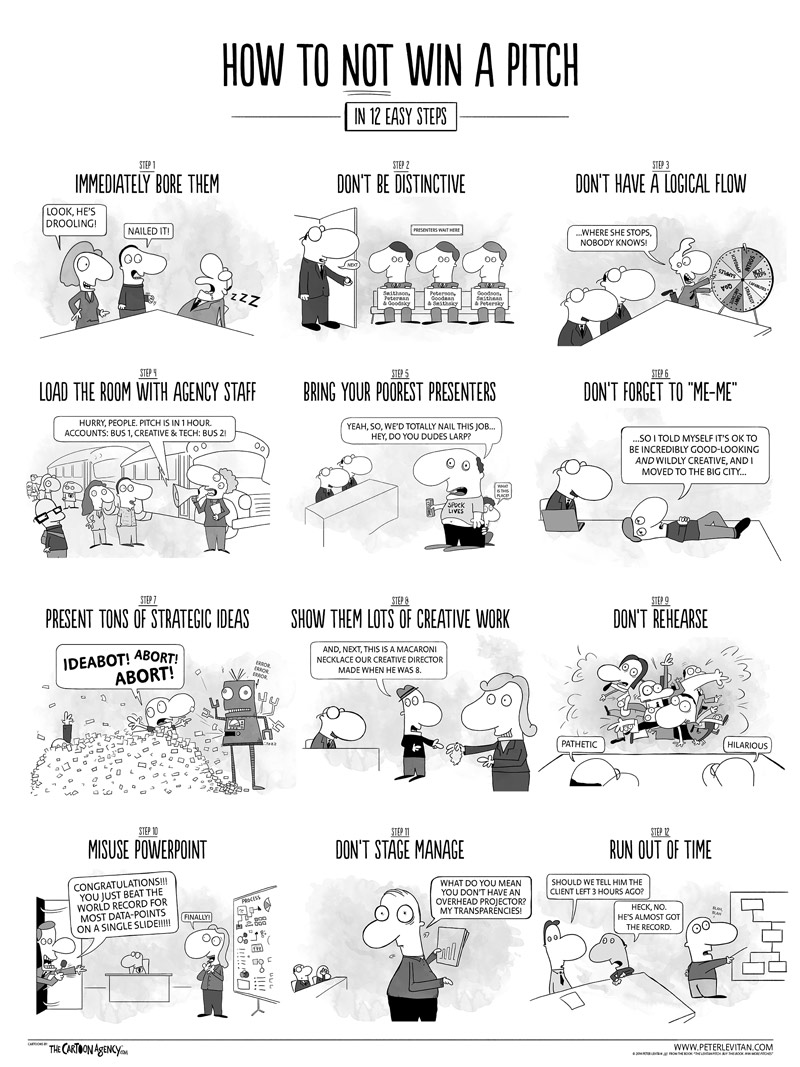An Interview With Gerry Preece. Ex-Global Director of Marketing and Media Procurement and Operations At P&G
 The following interview on the ‘wonderful’ subject of advertising agency procurement is with Gerry Preece, Senior Consultant, External View Consulting Group. I interviewed Gerry for my book, “The Levitan Pitch. Buy This Book. Win More Pitches.” because it is imperative that ad agencies understand the role of a client’s procurement department and its unique business objectives. While most (how is that for an understatement) agencies would rather negotiate directly with a marketing director, who they believe fully understands the role and value of marketing, the fact is that procurement is a fact of agency life when dealing with larger clients. I think that understanding the role of procurement will also benefit smaller agencies that deal directly with marketing departments and client management.
The following interview on the ‘wonderful’ subject of advertising agency procurement is with Gerry Preece, Senior Consultant, External View Consulting Group. I interviewed Gerry for my book, “The Levitan Pitch. Buy This Book. Win More Pitches.” because it is imperative that ad agencies understand the role of a client’s procurement department and its unique business objectives. While most (how is that for an understatement) agencies would rather negotiate directly with a marketing director, who they believe fully understands the role and value of marketing, the fact is that procurement is a fact of agency life when dealing with larger clients. I think that understanding the role of procurement will also benefit smaller agencies that deal directly with marketing departments and client management.
The Interview: Gerry Preece, Senior Consultant, External View Consulting Group
 Gerry Preece is the ex-head of marketing procurement for Proctor & Gamble, the world’s largest advertiser. Gerry spent 22 years at P&G where he was responsible for the sourcing of over $3Bn in marketing and media spend, including ad agencies, media, promotion, public affairs, design, digital and interactive, research and measurement, retail, branding, and production. He is the author, along with Russel Wholwerth, of 2013’s “Buying Less For Less. How to Avoid the Marketing Procurement Dilemma”, the definitive book on how advertising agencies should work with procurement. Gerry and Russel also led a 4A’s series of national seminars on how agencies can work more effectively with client procurement organizations.
Gerry Preece is the ex-head of marketing procurement for Proctor & Gamble, the world’s largest advertiser. Gerry spent 22 years at P&G where he was responsible for the sourcing of over $3Bn in marketing and media spend, including ad agencies, media, promotion, public affairs, design, digital and interactive, research and measurement, retail, branding, and production. He is the author, along with Russel Wholwerth, of 2013’s “Buying Less For Less. How to Avoid the Marketing Procurement Dilemma”, the definitive book on how advertising agencies should work with procurement. Gerry and Russel also led a 4A’s series of national seminars on how agencies can work more effectively with client procurement organizations.
I think that you will find Gerry’s perspective both enlightening and an opportunity to help you craft your message to win over any procurement executives in the decision-making process. While you are at it, you might want to brush up on your agency’s negotiation skills. You’ll see what I mean.
Most advertising agencies do not understand the role of procurement in agency selection. Can you help us out?
Gerry: Not only do ad agencies misunderstand the role of procurement, marketers themselves often don’t think about the role clearly either. In my opinion, Procurement should play the role of strategic sourcing professionals that includes:
Methodical development of internal needs and wants Methodical revaluation of external capabilities Connecting the two in smart, strategic ways Contingency planning
Relationship management
Not making marketing decisions
Work in conjunction with marketing leaders Ongoing work, not episodic
Lead the work of accountability
Procurement should hold advertising clients accountable for creating clear expectations and deliverables, while holding the agencies accountable for performance, efficiency, and procedures (where appropriate).
Not everyone sees it that way. Some think Procurement should look for ways to cut costs. Some of these people are CEOs, CPOs, CFOs, and even CMOs – sometimes.
Agencies need to know that not all Procurement organizations will fit the above, and they need to avoid treating Procurement as ‘monochromatic’ or ‘monolithic’ across all organizations.
You were the Global Director of Marketing Procurement at P&G. How was your approach different than your colleagues who procured standard materials?
Gerry: There are ten ways in which Marketing is structurally, fundamentally, intrinsically different than every other spend pool handled by Procurement (which include: materials, chemicals, packaging, production services, health care, food service, facilities management, travel services, manufactured items, etc.). The book Russel Wholwerth and I wrote (Buying Less for Less) details these ten areas at length. Because of the fundamental
differences between Marketing and other client purchases, the approach has to be different.
Four key ways in which my approach was different, “The Four Right Things”:
- Use the right metrics (not “savings”).
- The right metric is “Value Add”.
- Manage savings year-on-year.
- Manage cost avoidance (money not spent that would otherwise have been spent). These include incremental profit resulting from better campaigns, better marketing, better agencies, increased sales, and the associated incremental profit, etc. Remember when estimating incremental profit that fixed costs are already covered.
When the above is applied, people will naturally gravitate to the Incremental Profit area, as that is the big lever. Nobody else in Procurement used this metric – and I had to fight that.
Procurement executives should have:
The right mindset: I viewed my job as adding value, not just cost cutting.
The right skills: Marketing Procurement people need to be good strategic sourcers. Plus, they should have broad business skills (e.g. the discussion above about incremental profit and metrics should be second nature) and good relational skills – because process rigor, which exists elsewhere, doesn’t fit in marketing. So you have to succeed by working with others – others who don’t have to work with you.
The right assignment: All the above takes time – so these are longer-term assignments and should last for several years. Credibility, knowledge of marketing’s complexity, and relationships are critical and take time.
Was P&G’s procurement department involved in every agency selection? Are there types of searches where procurement should not play a role?
Gerry: Provided Procurement plays the right role (strategic sourcing experts) and applies the “Four Right Things” (outlined earlier), they should be involved in ALL agency searches and selections. Conversely, if they do not meet those criteria, then in my opinion, they have no business in any agency decision.
Procurement at P&G today is involved in every decision. It was during my years as well, limited only by Procurement department capacity. Also, “involvement” has migrated over the last fifteen years at P&G from “involved in an advisory capacity” to “key decision maker”. At the same time, Procurement “owned” sourcing for promotional marketing services (coupons, direct mail, etc.) and eventually took on more ownership for the more strategic stuff, like media and creative agency selection.
Agencies think that the primary roll of procurement is to cut costs and reduce spending. They think that procurement does not understand or appreciate the ‘magic’ of advertising. Is this true?
Gerry: Sadly, in too many cases, yes. But in many cases, Procurement is doing a pretty good job – there’s a bell curve.
However, when things are not good, agencies terribly misdiagnose the problem. What they fail to recognize is that in these cases, Procurement individuals are not making up the rules regarding the role of Procurement. They have been sent by someone above them to do exactly what they’re doing. Somebody – perhaps a CPO or CFO or CMO – has given them the cost savings remit and deliverable and they are the problem. The Procurement practitioner is doing what they are being measured on. Attack the scorecard (the metrics) and the person who issues the scorecard – otherwise agencies will waste their time, and nothing will improve.
Again, there is not one homogeneous definition of a “Procurement” department. Instead there are hundreds of them, and they are all different in terms of metrics, deliverables, areas of focus, emphasis on savings, etc. Agencies need to stop complaining, and get smart.
Figure out what Procurement’s role is for a given client – and figure it out fast.
If it‘s wrong (not the “Four Right Things”), then effectively influence the changes needed (see Buying Less for Less), and this usually starts by engaging the CMO.
Stop acting powerless and drive the changes: agencies have a lot of power and a lot at stake but incorrectly think they are impotent. They simply need to see the problem clearly (“Four Right Things”), and attack the problem smartly (articulate the ten differences and “Four Right Things” to the CMO).
You’ve mentioned the idea that marketing is an investment not a one-time purchase. Can you elaborate?
Gerry: Unlike every other spend area that Procurement touches, we spend dollars on marketing because we want to, not because we have to. And we want to spend marketing dollars because we get a return on those dollars. (If not, stop spending!) And therefore, any discussion of “savings” is silly and irrelevant. It only changes the denominator. Why would we not also, at the same time, look at changing the numerator (return)? Surely when we fiddle with one, we impact the other, right? So the idea becomes to look at ROI, not at just the spend alone.
How can procurement help CMO’s measure results and metrics?
Gerry: Procurement can only help here by applying unbiased and objective operational rigor. We can make no judgments about the quality of the marketing.
But Procurement can and should collect the info, apply it to a system of metrics, and use that as one of many criteria to make decisions. This is similar to what Procurement does elsewhere – we don’t decide on food service quality or performance; food service pros do. We don’t decide on a chemical’s performance or manufacturing handle-ability; manufacturing pros do. What Procurement does is rigorously and objectively collect the data and bring it to bear on sourcing decisions.
We all know that CMO tenure can be an issue. How does this factor into how procurement works with CMO’s in agency selection?
Gerry: Generally, Procurement serves the CMO, so our role will change depending on the CMO. I’m not aware of any situations where Procurement selects agencies and the CMO gets “stuck” with those decisions.
Procurement has an obligation to sort out reasoned rationale from favoritism. If a new CMO wants to fire the old agency and hire his “favorite” agency simply because he’s pals with them, Procurement has an obligation to push back and to insist on a fair and objective process. But, in every case I can think of, CMO’s (not Procurement) ultimately make that call.
When it comes to contracts and service agreements, are agencies good negotiators? If not, how can they learn this art?
Gerry: In 95% of the cases, agencies are babes being led to slaughter. Terrible. Naive. Wishful. They get creamed. They are up against professional negotiators, and they often put their unskilled (in negotiations), nicest, most accommodating people against Procurement. It’s generally a blood bath.
(I just had to highlight this statement about agency negotiators.)
The biggest problem (my opinion) is the ridiculous love affair out there with “principle-based” negotiation approaches (i.e. ‘Getting to Yes’). These are win-win approaches we’ve all fallen in love with because we hate conflict, we hate negotiating with mean people, and we want to live in harmony.
The key problem with all that is that Procurement people are schooled in “positional” negotiating strategies and tactics (win-lose), and positional beats principled every time.
The second biggest problem is that many agencies don’t do any formal negotiation training for their folks. They should be training in negotiations skills and develop strong negotiators. And, they should embrace positional negotiations skills – because that’s often how Procurement’s playing the game.
How can agencies demonstrate their understanding of the role of procurement when they are pitching?
Gerry: Ask what the role is and demonstrate you know there is no “one way” Marketing Procurement folks operate.
Ask what their metrics are – cost savings? Value-add? If value-add, how is that measured?
Ask who the Procurement executive reports to and ask what they are being held accountable to deliver.
Lay out a simple strategic sourcing model and ask them to explain their role in that perspective.
Get great back office hygiene, and make it a deliberate part of your capabilities presentation. Include it in your video credentials and deck. Proactively address it with statements like (I’m making this up): “We practice ISO 9000 rigor in our accounts payable and receivables area; we strategically source all our third party services with professional buyers who know their markets and actively negotiate competitive rates on post-production work, equipment rental, etc.; we review our vendor’s procedures and challenge them on off-shoring where it makes sense; we periodically audit our vendors, etc.” Don’t wait for Procurement to ask about these things.
Proactively manage the message, which is that “we spend every dime thoughtfully, carefully, and professionally – and we run a tight ship when it comes to financial matters and third party arrangements.”
———————————————————————–
The Book On Pitching and Winning New Wonderful Clients
This interview is one of many with clients, agency pitch consultants and more in my book on advertising agency pitching. You can buy “The Levitan Pitch. Buy This Book. Win More Pitches.” at Amazon.
———————————————————————–
I invite you to sign up below for my free, weekly newsletter. When you do, you’ll receive a very brief email about my posts – that way you’ll never miss any incredibly useful insights.





